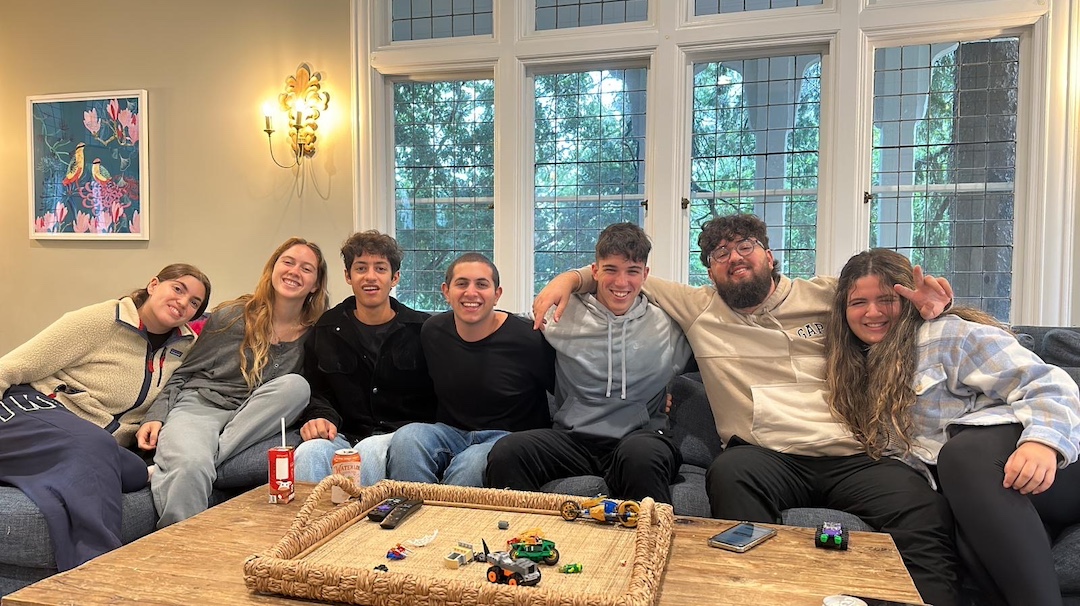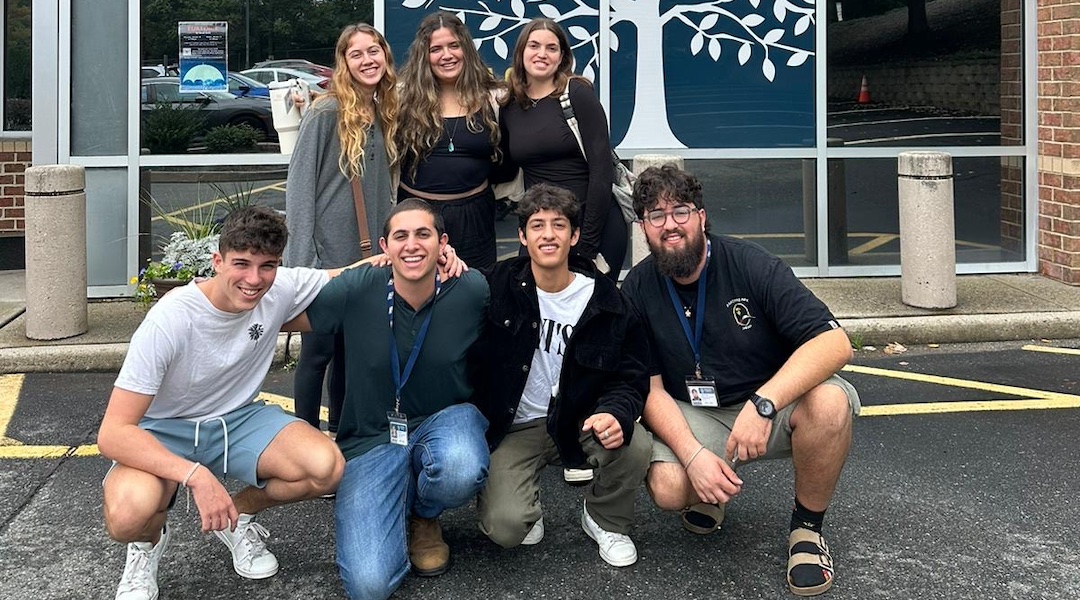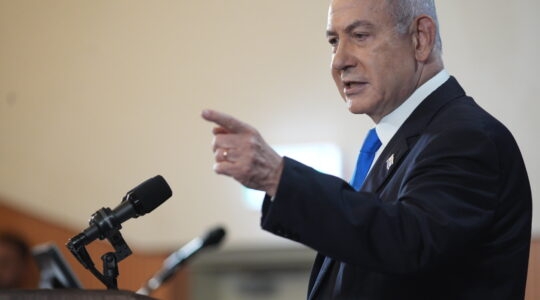This article was produced as part of JTA’s Teen Journalism Fellowship, a program that works with Jewish teens around the world to report on issues that affect their lives.
(JTA) — Naama Hertz signed up to come to America to teach diaspora Jews about life in Israel. Assigned to St. Louis, the Israeli teen couldn’t wait to talk to students about the food, music, dance and culture of the country she loves so much.
She never imagined that only months into her year-long IDF deferment she would be speaking to non-Jewish women and girls at the National Charity League about the Israel-Hamas war or representing her country amidst record-high levels of antisemitism.
Hertz is one of 150 Israeli 18-year-olds who delayed their army service to spend a year outside of Israel as emissaries beginning in September 2023. The program, run by the Jewish Agency for Israel, places the teens in synagogues, schools, JCCs, Jewish federations and other institutions in the United States, Canada, Europe and other countries. Emissaries, hosted by Jewish families, learn about Jewish life in the diaspora while teaching the communities about Israel. The teens are called ShinShinim, from the Hebrew word for shnat sherut, meaning “year of service.”
When the Israel-Hamas war began on Oct. 7, their placement became much more complicated. They had to grapple with the responsibility of representing a country at war, a country often vilified and defamed. Their Israel lessons suddenly had a lot more weight, inextricably linked to the current conflict. Meanwhile, thousands of miles away, their country was under attack and many of their friends and family were fighting on the front lines.
“The first few days were very difficult, we had to try to convince some of them to get out of bed,” said Tamar Reshef, the ShinShinim organizer for the Jewish Federation of Greater MetroWest New Jersey. “It was very hard. And the news just kept coming.”
“I felt guilty that I live here, that I’m here and not in Israel,” said Yadren Korazim, a ShinShin in Chicago. “It was very hard for me to just stay here and not help.”
Korazim watched as her friends and family signed up to volunteer, pack food for soldiers, and help Israel in any way they could. She felt helpless and her first instinct was to return to Israel immediately. But soon, as she led Israel activities with American students, writing letters to soldiers and educating the Americans about the conflict, it became easier and she settled into her place within the war effort.
While some of the ShinShinim contemplated returning home, whether to visit family or enlist immediately in the Israel Defense Forces, ultimately the Jewish Agency convinced them that they would be able to make even more of an impact staying in America.
Before the war, the ShinShinim’s responsibility was to create an understanding of Israeli culture and everyday life. Now, the stakes are higher. While they still aim to teach about the everyday aspects of the country, their lessons have a new undertone. They feel that it is impossible to teach about Israel right now without it being about the war.
“Even talking about the Israel National Trail or the Dead Sea right now, the thing that’s important right now is to keep Israel in mind,” said Rotem Reshef, an Israeli emissary in Greater MetroWest, which includes the suburbs west of Newark, New Jersey. “Even if it’s not talking exactly about [the war], it’s leaving an impact on the kids.”
They work with mostly Jewish groups, where evidence of positive aspects of life in Israel is a useful reminder for teens who are faced with anti-Israel sentiment on a regular basis in school and on social media. The ShinShinim see themselves as teachers and social ambassadors to Israel for non-Israeli Jews.
Yarden Korazim works at the Israel Education Center at a Chicago suburb public school helping in the Hebrew language class. She changed her lesson plans after Oct. 7.
“After everything happened, we thought that it was very important to pause and to stop the fun activities and to talk a little bit about what’s going on,” she said.
She showed the class photos of her father, who is currently serving in the IDF. Other Chicago ShinShinim shared stories of their friends, many of whom are similar ages to the students. She said this made the war personal, giving the students a connection and faces to place in the news they have been hearing.
“When you have a person that represents something, it’s much easier to look at it than seeing it on social media or on the internet or from far away,” said Reshef.
This was always the mission of the ShinShinim, to be a familiar Israeli teen face for teenage Jews living outside of Israel. But now, at a time when tensions surrounding Israel are so high, it is that much more important for Jews to have personal connections to Israel.
Reshef hopes the students remember her rather than any specific activity she led or lesson she taught, even if it is off-hand as being able to go to their friends and say, “Oh yeah, this girl from Israel came to speak with us.” A casual, positive experience with an Israeli, she said, will make the teenagers less likely to fall into propaganda traps that villainize or spread false information about Israel that has spread since the war’s outbreak.
“I feel that every conversation that they have with the Shinshin will just change their mind,” agreed Yarden Korazim. “They really feel that Israel is a thing and not just a name of something they learned.”

Rotem Reshef (second from left) with the other ShinShinim of the Jewish Federation of Greater MetroWest New Jersey. (Daniel Seri)
Living outside of Israel, the Israeli teens have begun to understand and experience a level of antisemitism that they don’t face back home.
Naama Herz works at a St. Louis Hebrew school as a part of her gap year, and one week it was closed due to a bomb threat. She said this was the first time she really felt the weight of antisemitism personally.
“It just breaks your heart,” Herz said. “Why can you ruin a person’s life because of hate?”
Other ShinShinim said they felt scared to outwardly express their Judaism or Israeli identity.
“It’s this feeling that I can’t really speak Hebrew in public places,” said Chicago-based Korazim. “I’ve never felt that way [before]. It’s made me realize how Israel is a country that has to exist.”
The program, especially during such a difficult and highly charged year, also provides teens with tangible skills for when they return to Israel. It has shaped the kind of person they are going to be when they do join the IDF after their deferment.
“I learned how to be far from home and still make myself feel like home here,” Reshef said. “I learned how to solve conflicts and not panic through every little thing. I think all of these things will be very helpful when I’ll be in the army and need to cope with some difficult situations.”
“But I think more than anything else, after Oct. 7 I feel super motivated to come back home and serve my country. And I can say it’s not only me who feels that way. Every person my age who is about to serve in the army next year just can’t wait to give their part to the system.”
Working away from their home has not been easy. It is difficult to get the events in Israel out of their minds.
“If there are sirens going on right now in Israel, you can’t get it out of your head,” said Itai Nussbaum, a ShinShin in Detroit. “You keep thinking of it while you’re doing something else.”






